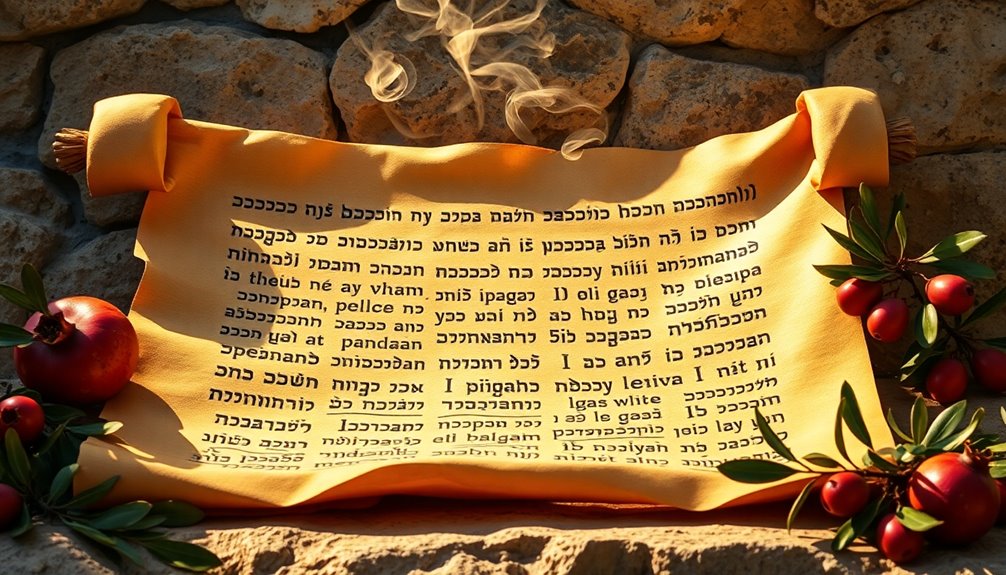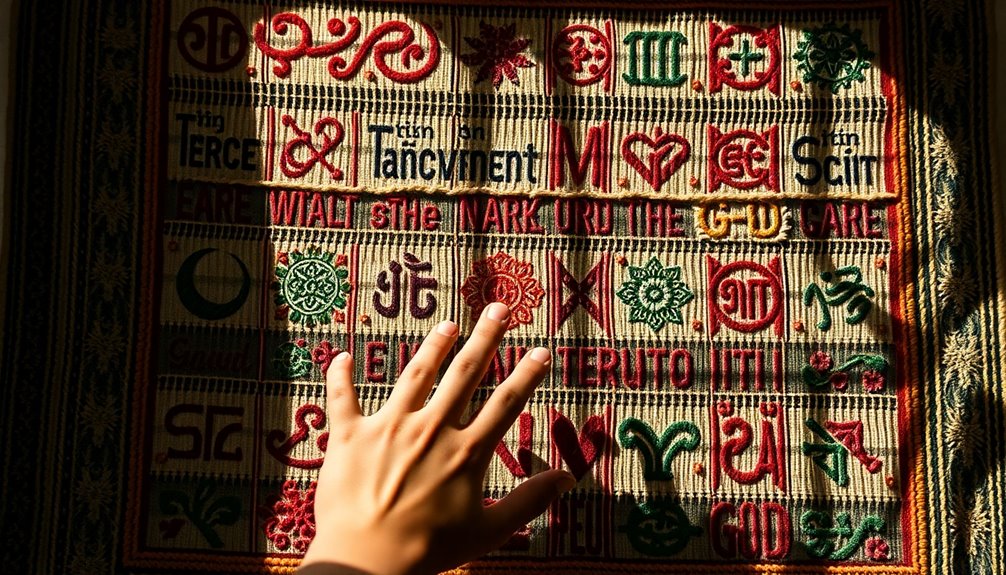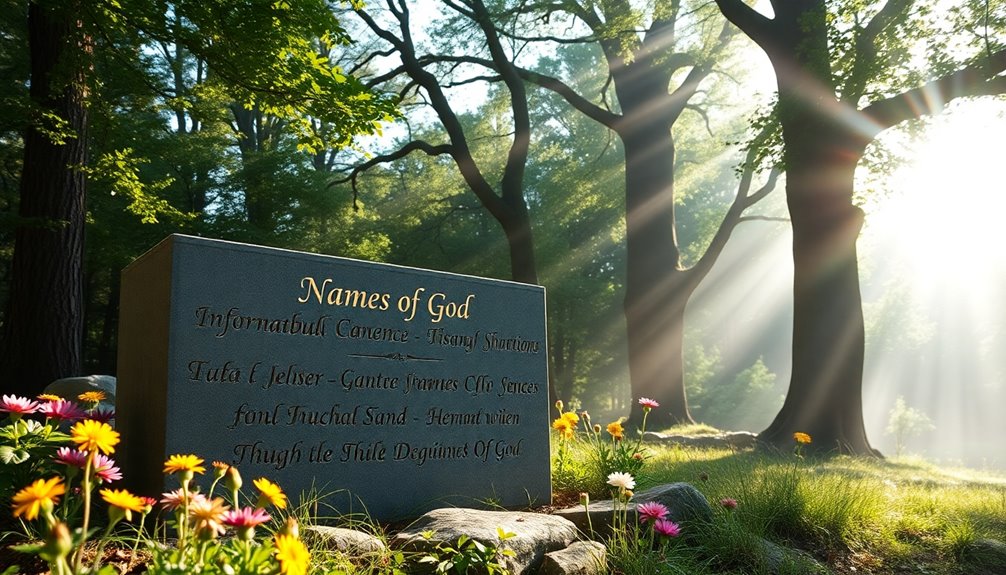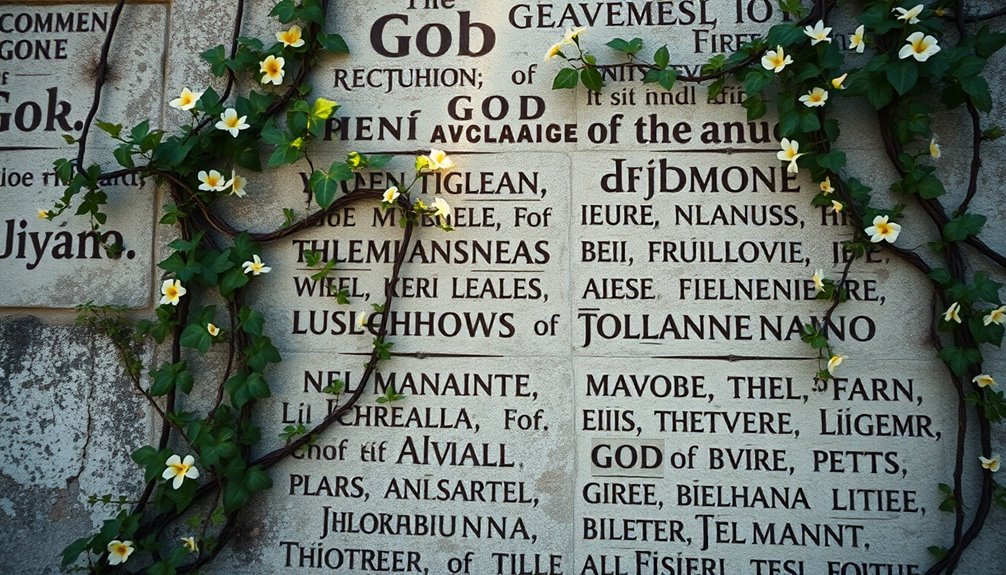You might be surprised to learn about lesser-known names of God that reveal different facets of His character. For instance, El Roi means "The God Who Sees Me," showcasing His intimate care. Jehovah Nissi stands for "The LORD Our Banner," emphasizing His protection during challenges. Names like El Elyon and Yahweh Tsuri highlight God's sovereignty and reliability. Each name adds depth to your spiritual understanding and enhances prayer life. Exploring these names can transform your relationship with God. Curious about more intriguing names and their meanings? You won't want to miss what else is out there!
Key Takeaways
- El Roi: Means "The God Who Sees Me," highlighting God's intimate awareness of individual struggles and His compassionate nature.
- El Elyon: Translates to "Most High God," emphasizing God's ultimate sovereignty and authority over all creation.
- Yahweh Tsuri: Signifies "The LORD My Rock," representing God's reliability and strength during life's challenges.
- Jehovah Nissi: Means "The LORD Our Banner," illustrating God's protective presence and victory in spiritual battles.
- Jehovah Rapha: Signifies "The LORD Who Heals," encompassing both spiritual restoration and divine compassion for humanity.
Introduction

In exploring the lesser-known names of God, you might discover profound insights that can transform your understanding of His nature. Many names, like El Roi, meaning "The God Who Sees Me," reveal God's intimate care for each individual. This name emphasizes that God is aware of your struggles and joys, fostering a deeper connection with Him.
Similarly, names such as El Elyon, or "Most High God," highlight His sovereignty and authority over all creation, reminding you of His ultimate control in your life.
As you delve into other names, Yahweh Tsuri, which translates to "The LORD My Rock," symbolizes God's reliability and strength during life's challenges. This assurance can give you courage when facing difficulties.
Moreover, Jehovah Nissi, meaning "The LORD Our Banner," signifies God's protection and victory, illustrating His guidance and support in your battles.
Understanding these surprising names enhances your relationship with God. Each name reveals different facets of His character, enriching your prayer and worship experience. By embracing these names, you can cultivate a more profound appreciation of who God is and how He interacts with you personally.
Scriptural Insights on God's Names

When you explore the names of God in Scripture, you'll find rich insights that reveal His character and relationship with His people.
Primary references, like El Roi in Genesis and Jehovah Nissi in Exodus, highlight His personal care and sovereignty.
Secondary references further deepen your understanding of His nature, showing how each name reflects His promises and power.
Primary Bible References
Understanding the names of God in the Bible reveals profound insights into His character and attributes. For instance, Elohim appears first in Genesis 1:1, showcasing God Almighty's creative power and sovereignty as the ultimate Creator. This name emphasizes His authority over all creation.
In Genesis 15:1-2, Adonai is introduced, meaning "The Lord." This name highlights God's personal relationship with Abram, emphasizing trust and faithfulness in covenant promises. It reassures you of His reliability.
The name El Roi, found in Genesis 16:13-14, reveals God's intimate care for individuals. When Hagar was in distress, God showed His compassion, reminding you that He sees and understands your struggles.
Jehovah Shalom, meaning "The LORD Is Peace," is introduced in Judges 6:24. This name reminds you that God is the source of wholeness and tranquility, even amidst life's chaos.
Lastly, Yahweh Tsuri, or "The LORD My Rock," signifies God's stability and reliability. Throughout the Psalms, this name provides assurance during times of trouble, reminding you that you can rely on Him as your steadfast foundation.
Secondary Bible References
Exploring the secondary names of God in Scripture expands your comprehension of His nature and relationship with humanity. Each name of God reveals a unique aspect of His character, offering insights into how He interacts with His creation.
For instance, El Shaddai, often translated as "Almighty God," emphasizes His all-sufficient power, while the name El Olam, or "Everlasting God," found in Genesis 21:33, underscores His eternal nature and the permanence of His promises.
In Jeremiah 23:6, you encounter Jehovah Tsidkenu, meaning "The Lord Our Righteousness," highlighting God's provision of righteousness for His people. The title Yahweh Mekaddesh, or "The Lord Who Sanctifies," in Exodus 31:13, showcases His role in setting apart His people for holiness.
Isaiah 9:6 introduces El Gibbor, translating to "Mighty God," which reveals His strength as a protector and warrior, particularly for the God of Jacob.
Together, these secondary names enrich your understanding of God's multifaceted character and deepen your relationship with Him, reminding you of His unwavering presence and promises in your life.
Ancient Names in Hebrew Culture

Ancient Hebrew culture placed immense importance on names, often embedding profound meanings and attributes within them. In this ancient world, names weren't just labels; they reflected the character and relationship individuals held with God. For instance, the name YAHWEH emphasizes God's personal and covenantal bond with His people, underscoring that God doesn't change.
Many Hebrew names reveal aspects of God's character, like "Eli," meaning "my God," and "Isaac," which means "laughter," symbolizing the joy surrounding his miraculous birth. Such naming practices often conveyed prophetic or descriptive meanings that highlighted divine attributes.
Furthermore, the Tetragrammaton (YHWH) represents the sacred, unchanging nature of God, an identity revered in Hebrew culture and not spoken lightly. Names also carried social significance; for example, "Ben" means "son of," indicating family lineage and heritage.
In this context, you might encounter designations like El Roi, meaning "God Who Sees," illustrating the divine names that capture God's omniscience.
These ancient names not only connect individuals to their identity but also to the God of Abraham and His enduring legacy.
Cultural Significance of Names

Names in the Bible carry deep cultural significance, often reflecting the character and pivotal events tied to individuals. When you explore the cultural significance of names, you find that they reveal much about God's relationship with humanity. In the Old Testament, unique names like "El Roi" (The God Who Sees Me) highlight the personal and intimate nature of God's connection to people. Each name carries profound meanings that enhance your understanding of who God is and how He interacts with us.
God says that names matter, as they signify His evolving relationship with humanity throughout history. The impact of names like "Jehovah" or "Jesus" varies across cultures, resonating differently in diverse societies. This cultural significance shapes how communities express their faith and interpret God's character.
However, it's essential to remember that modern interpretations can sometimes misidentify or reinterpret these names, leading to a disconnect from their original biblical significance. By delving into the unique names of God, you can deepen your appreciation for the rich tapestry of meaning woven throughout the scriptures and cultivate a more profound connection to the divine.
Misunderstandings About God's Names

You might think God's names are straightforward, but many misconceptions cloud their true meaning.
Cultural interpretations vary widely, and misunderstanding these names can limit your grasp of His nature and purpose.
Let's unpack these common myths and explore the rich significance behind God's names. Understanding these names can also provide insight into emotional challenges, similar to how narcissistic relationships can distort our perception of love and self-worth.
Debunk Common Misconceptions
How often do we overlook the deeper meanings behind God's names? Many misconceptions surround these sacred titles. For instance, while the name El Shaddai means "Almighty God," it signifies not just power but also God's ability to perform the impossible—think of Abram's miraculous encounter with Isaac.
Similarly, when you hear Yahweh, or "I AM WHO I AM," it may seem like a static label. In reality, it emphasizes God's eternal and unchanging nature, deeply connected to His people.
Another common misunderstanding lies with Jehovah Jireh, often reduced to simply providing material needs. However, this name reveals a broader promise of God's eternal salvation and daily provisions.
You might also think of Jehovah Rapha as merely the "LORD Who Heals," but it envelops a deeper aspect—spiritual restoration and God's compassion for human suffering.
Lastly, names like El Roi, which means "The God Who Sees Me," highlight God's personal care, appearing just once in Scripture but resonating deeply with His attentive nature.
Cultural Interpretations Vary Widely
Cultural interpretations of God's names often distort their true meanings, leading to widespread misunderstandings. For instance, names like Jehovah and Elohim are frequently misrepresented, overshadowing their implications in various contexts. Many people mistakenly believe names such as El Shaddai or Yahweh reflect fixed attributes, ignoring their dynamic relationships with God's evolving work throughout the Old and New Testaments.
The name of Jesus tends to dominate discussions, causing a lack of awareness about the significance of different names of God that reveal His character and actions. This narrow focus can lead to misunderstandings about the richness of God's biblical names.
Cultural associations further skew perceptions; names like Julius may be recognized for historical significance but often disconnect from their original biblical meanings.
Surveys show that while names like Mary and Paul are widely recognized, lesser-known biblical names suffer from misidentification. This highlights the urgent need for greater education on the full breadth of God's names.
Understanding these names can deepen your insight into God's character and the complexities of His relationship with humanity, enriching your spiritual journey.
Daily Prayer Practices

Incorporating daily reflections on the names of God can transform your prayer life and deepen your understanding of His character.
Consider setting aside time each day to focus on a specific name, allowing it to guide your prayers and thoughts.
Joining congregational study sessions can also enhance your experience, as you explore these names together and strengthen your community's faith.
Daily Reflection on Names
Reflecting daily on the names of God can transform your prayer life and deepen your understanding of His character. Each name reveals unique attributes that invite you to engage more intimately with Him.
For instance, incorporating Jehovah Jireh, meaning "The LORD Will Provide," into your prayers can strengthen your trust in God's provision for both spiritual and physical needs.
As you meditate on El Shaddai, or "Almighty God," you acknowledge His power, especially when life feels overwhelming. This daily reflection fosters spiritual growth by focusing your thoughts on specific aspects of God's nature.
In times of distress, calling upon Jehovah Rapha, "The LORD Who Heals," reassures you of His care and ability to restore.
Moreover, reflecting on names like Jehovah Shalom, "The LORD Is Peace," cultivates a sense of inner peace amidst life's chaos.
Congregational Name Study Sessions
Congregational name study sessions can be a powerful way to deepen your understanding of God's attributes and enhance your communal prayer practices. When you gather with others to explore the names of God, like El Roi (The God Who Sees Me) and Jehovah Nissi (The LORD Our Banner), you'll find yourselves inspired to reflect on His character.
This isn't just a Bible study; it's a journey into the heart of the Almighty. You'll love studying how these names reveal the promises of God to the people of Israel and how they apply to your daily life. Each session can include discussions on the historical significance and context of these names, allowing everyone to appreciate their relevance in contemporary worship.
As the Holy Spirit guides your conversations, you'll likely discover a deeper, more intimate connection with God. Consider using devotionals or journals focused on God's names to facilitate ongoing learning.
These resources can help you cultivate a personal commitment to grow in faith alongside your fellow congregants. By engaging in this practice, you're not just learning; you're enriching your spiritual lives together—a truly great post for anyone seeking a closer walk with the Lord.
Key Takeaways on God's Names

God's names offer profound insights into His character and relationship with humanity. Each name God has, like El Roi and El Shaddai, reveals a specific name that reflects an aspect of God's nature—His personal care and His ability to perform the impossible.
When you understand names like Jehovah Jireh, denoting God's provision, or Jehovah Rapha, representing His healing power, you gain a deeper appreciation for the one true God and His promises.
Names such as Yahweh Tsuri (The LORD My Rock) and Yahweh Tsebaoth (The LORD of Hosts) provide assurance of stability and divine protection during life's storms. As God said, these names serve as a memorial to all generations, reminding you of His faithfulness throughout history.
Exploring the lesser-known names of God can enrich your personal devotionals and enhance your prayer life. Each name you discover deepens your understanding of the Mighty Creator and His relational qualities.
Embracing these names allows you to connect more intimately with God, fostering a vibrant relationship that reflects His nature and promises. So, dive into this rich heritage and let the names of God transform your faith journey.
Additional Resources

To deepen your understanding of the names of God, consider exploring a variety of resources that engage both your mind and spirit.
Start with devotionals and journals that focus on names like El Roi (The God Who Sees Me) and Jehovah Nissi (The LORD Our Banner). These resources can help you uncover unique aspects of His character and attributes.
You can also find interactive materials, such as a 10-page printable resource on the names of God, which includes scriptural references and their meanings. This is perfect for personal study or group discussions.
Don't overlook the wealth of knowledge found in books dedicated to exploring God's names. These readings can enhance your biblical comprehension and strengthen your personal relationship with Him.
Additionally, participating in community studies or discussions focused on the names of God fosters collaboration and insight-sharing. Engaging with others can deepen your understanding of His diverse character and attributes, making your study more enriching.
As you explore these resources, you'll find that each name of God reveals profound truths about who He is and His involvement in your life.
Frequently Asked Questions
What Is a Unique Name for God?
A unique name for God is El Roi, which means "The God Who Sees Me." This name emphasizes that God is intimately aware of your struggles and knows your heart.
It's a comforting reminder that you're never alone in your challenges.
Another meaningful name is Jehovah Rapha, translating to "The LORD Who Heals." This highlights God's compassionate nature, encouraging you to seek His healing in both your physical and spiritual life.
What Is the Forgotten Name of God?
The forgotten name of God can often refer to El Bethel, which means "God of Bethel." This name signifies His profound presence and covenant with Jacob.
You might also consider names like Yahweh Tsidkenu, highlighting His role in providing righteousness, or El Elyon, emphasizing His supremacy.
Each name reveals a different aspect of God's nature, inviting you to explore the depths of His character and the significance behind these powerful titles.
What Is the Rarest Name in the Bible?
The rarest name in the Bible is "El Roi," which means "The God Who Sees Me."
You'll find it in Genesis 16:13-14, where Hagar, feeling distressed, encounters God. This name emphasizes God's awareness and compassion, reminding you that you're never alone in your struggles.
Other uncommon names like "Yahweh Tsuri" and "Jehovah Nissi" also reflect God's attributes but don't appear as frequently in Scripture, making them less recognized.
What Is God's Secret Name?
God's secret name is often understood as YHWH, which means "I AM WHO I AM." This name emphasizes His eternal and unchanging nature.
When you delve into the significance of YHWH, you realize it reflects a deep, personal relationship God desires with you.
In Jewish tradition, it's so sacred that it's rarely pronounced aloud, often replaced with "Adonai" to show reverence.
Understanding this name can enhance your connection to His divine purpose.










